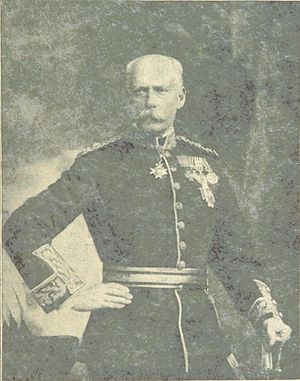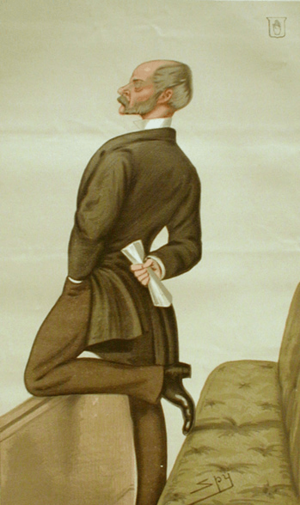Sir Henry Havelock-Allan, 1st Baronet facts for kids
Quick facts for kids
Sir Henry Havelock-Allan, 1st Baronet
|
|
|---|---|
 |
|
| Born | 6 August 1830 Cawnpore, India |
| Died | 30 December 1897 (aged 67) Khyber Pass, Afghanistan |
| Buried |
Harley Street Cemetery, Rawalpindi
|
| Allegiance | United Kingdom |
| Service/ |
British Army |
| Years of service | 1846–1881 |
| Rank | Lieutenant General |
| Unit | 10th Regiment of Foot |
| Battles/wars | Anglo-Persian War Indian Mutiny New Zealand Wars Anglo-Egyptian War |
| Awards | Victoria Cross Knight Grand Cross of the Order of the Bath Mentioned in Despatches |
| Relations | Major General Sir Henry Havelock (father) Joshua Marshman (grandfather) Hannah Marshman (grandmother) |
Lieutenant General Sir Henry Marshman Havelock-Allan, 1st Baronet was a brave British soldier and politician. He was born on August 6, 1830, and passed away on December 30, 1897. He held the high rank of Lieutenant General in the army. The name 'Allan' was added to his surname in March 1880.
Contents
Early Life and Family Background
Henry Havelock was born in Cawnpore, India, on August 6, 1830. His father was Major General Sir Henry Havelock, a famous soldier. His mother was Hannah, whose maiden name was Marshman. Her parents, Joshua and Hannah Marshman, were missionaries.
A Soldier's Journey: Military Career
Starting in the Army
Henry Havelock joined the army in March 1846 as an Ensign. This was a junior officer rank. He first served in India with the 39th Regiment of Foot. Later, he moved to other regiments, including the 10th Regiment of Foot in 1852.
Fighting in Persia and India
Havelock fought in the Persian campaign from 1856 to 1857. After this, he returned to India. He was there when the Indian Mutiny began in May 1857.
On July 16, 1857, a battle took place in Cawnpore. The 64th Regiment was under heavy attack. The enemy was getting ready to fire a large cannon again. Havelock bravely rode his horse to the front of his troops. He moved slowly towards the cannon, even as the enemy fired at him. His calm leadership helped his soldiers charge forward. They captured the cannon. For this act of bravery, Havelock received the Victoria Cross, a very high military award. Later, on September 25, 1857, he was badly hurt during the Siege of Lucknow.
Service in New Zealand and Canada
In 1860, Havelock returned to England. He later became a deputy assistant adjutant-general in Aldershot. In August 1863, he was sent to New Zealand with his regiment. There, he helped plan military movements. He served under Major General Duncan Cameron.
He took part in the Invasion of Waikato, which was a conflict in New Zealand. He was present at several important battles, including Rangiriri and Ōrākau. For his service, he was mentioned in official reports. He was also promoted to major in June 1864. In August 1866, he was made a Companion of the Order of the Bath.
In March 1867, Havelock was sent to Canada. He worked there for two years. After that, he spent three years in Dublin doing similar work.
War Correspondent and Retirement
In 1870, Havelock took time off to work as a War correspondent. This meant he reported on wars for newspapers. He saw the Franco-Prussian War and the Battle of Sedan. In 1877, he reported on the Russo-Turkish War. He was promoted to colonel in 1868 and major general in 1878.
Due to poor health, Havelock retired from active duty in December 1881. He was given the honorary rank of lieutenant general. However, when the Anglo-Egyptian War started in 1882, he couldn't stay away. He went to the British headquarters in Egypt. He even told a reporter that his wife thought he was on vacation. He wanted to see the action. He asked the British commander, Sir Garnet Wolseley, for a job. Wolseley, however, felt Havelock was not well enough to return to duty.
Despite this, Havelock still managed to see action. He was present at the battles of Kassassin and Tel el-Kebir. It is said that he even led a charge with only a riding crop!
Becoming a Baronet and Member of Parliament
In 1858, Henry Havelock was given the title of baronet. This title was originally meant for his father, who had passed away a year earlier. He and his mother also received a yearly pension of £1,000.
He later moved to England and became a Member of Parliament (MP). An MP is a person elected to represent people in the government. From 1874 to 1881, he represented Sunderland, his father's hometown. He later inherited a property called Blackwell Grange. To do this, he had to change his surname to Havelock-Allan. He then became an MP for South East Durham from 1885 to 1892.
Death in the Khyber Pass
Havelock was re-elected as an MP in 1895. That same year, he became the Colonel of the Royal Irish Regiment, which was stationed in India. In 1897, he was killed by local tribesmen called Afridi clansmen. This happened on the Afghanistan side of the Khyber Pass. He was later buried in Rawalpindi.
His Writings
In 1867, Havelock wrote a book called Three Main Military Questions of the Day. In this book, he wrote about important military topics. These included how to have a strong army at home, how to manage India's military costs, and how new types of guns affected cavalry (soldiers on horseback).
 | Claudette Colvin |
 | Myrlie Evers-Williams |
 | Alberta Odell Jones |


